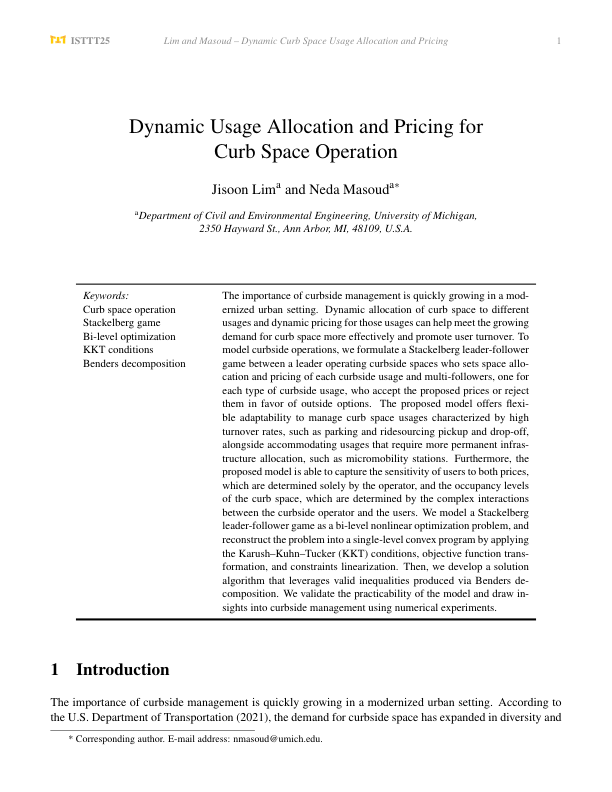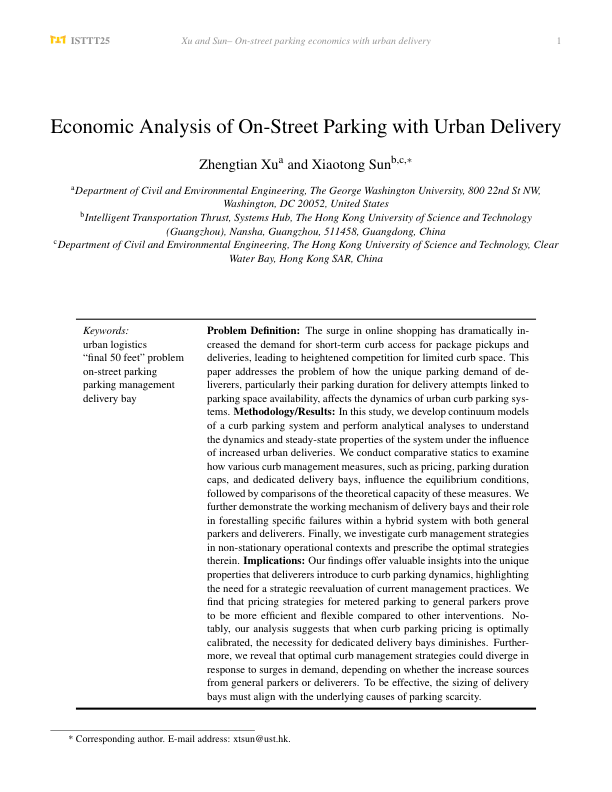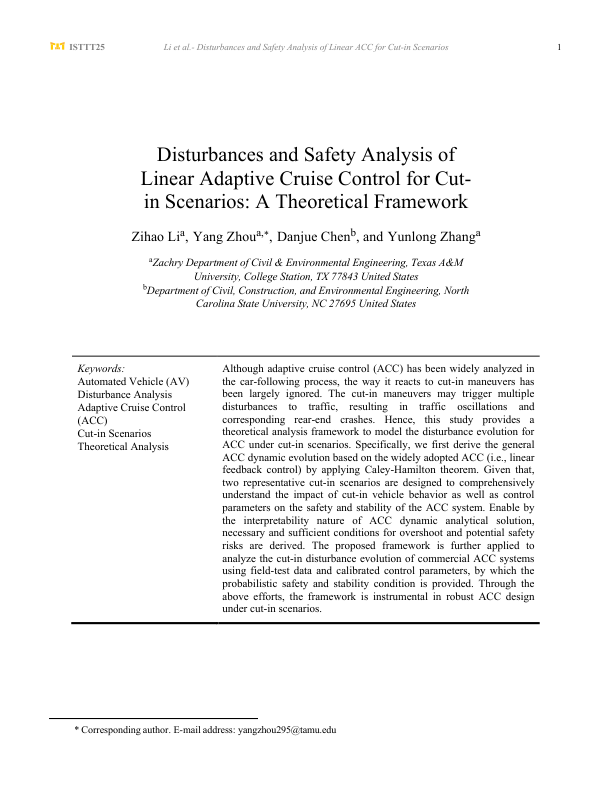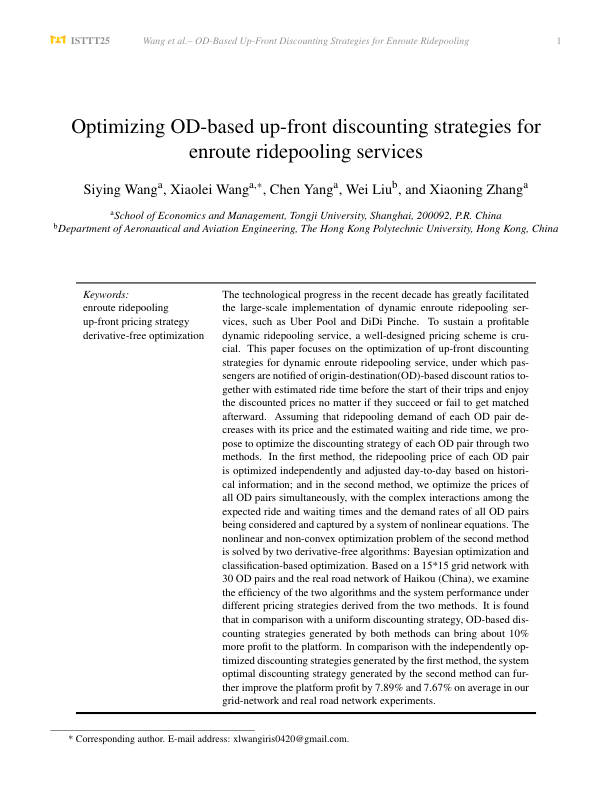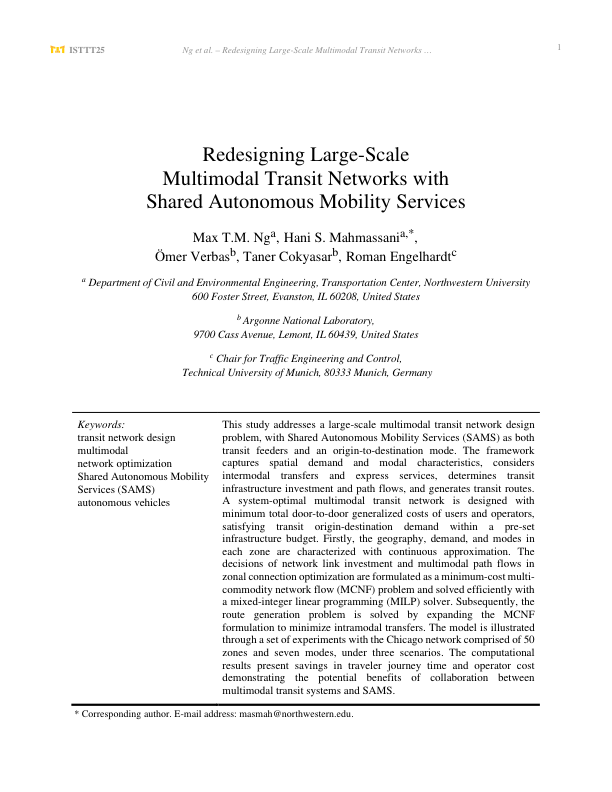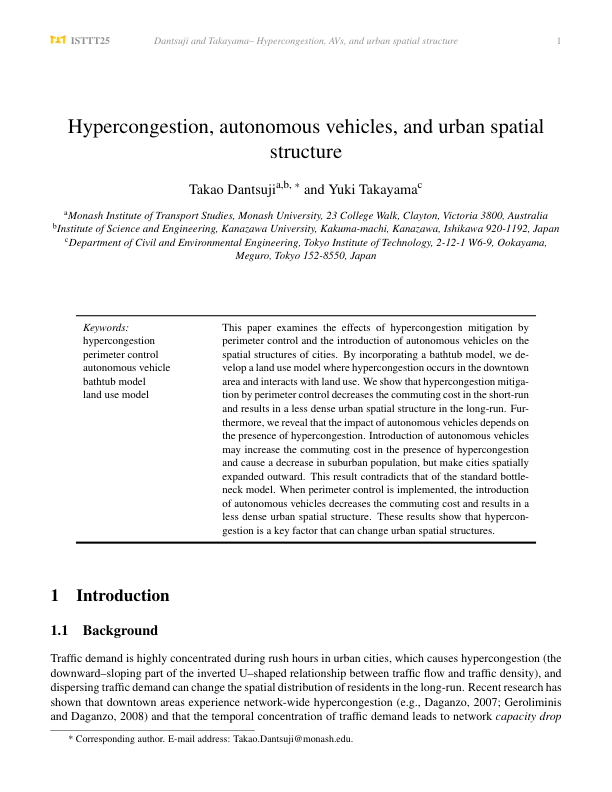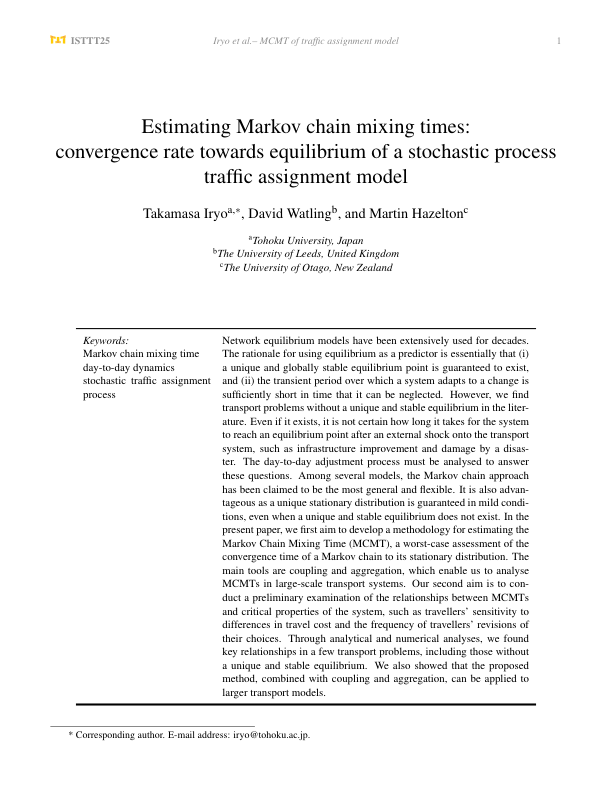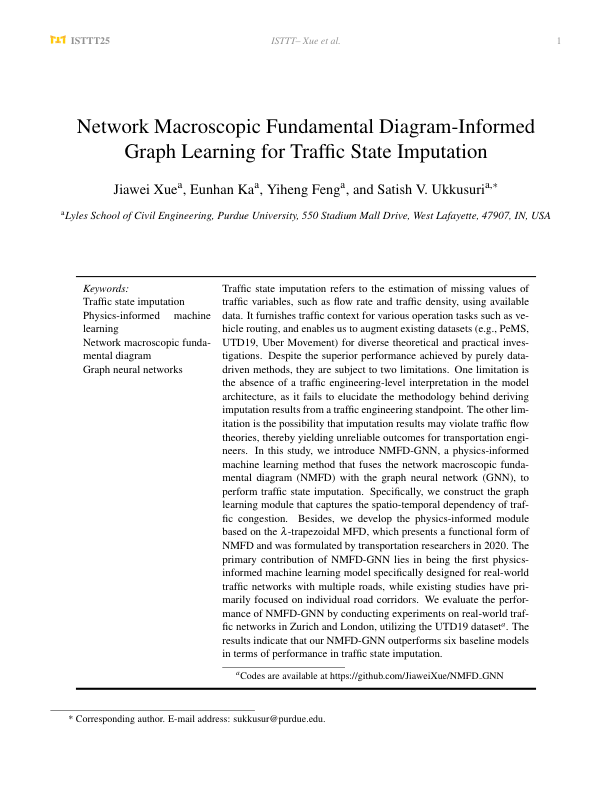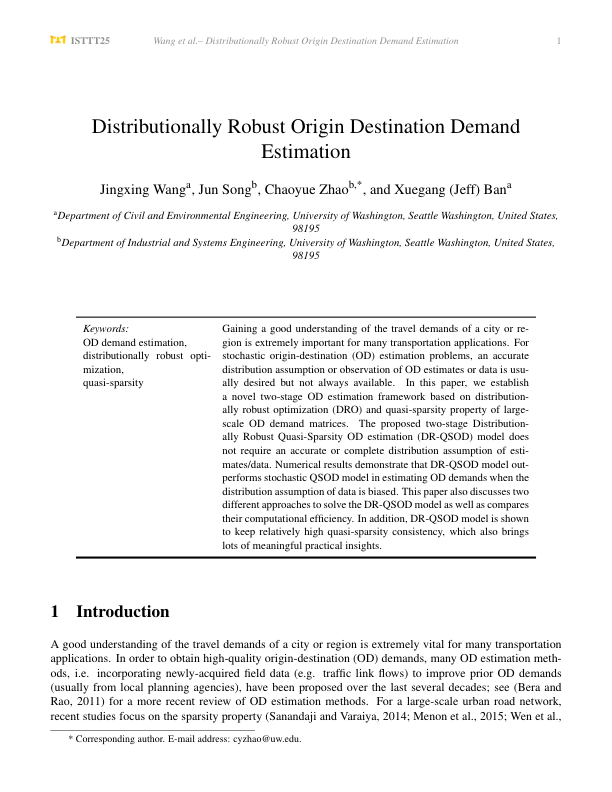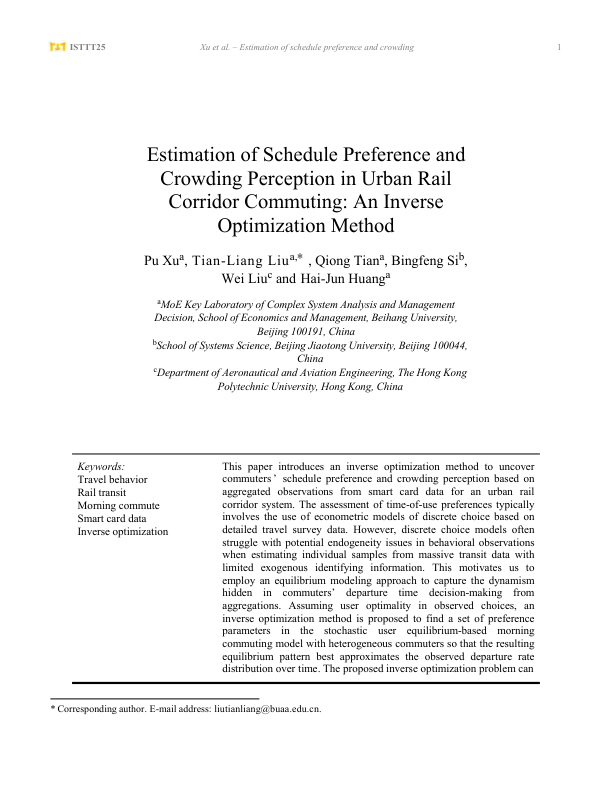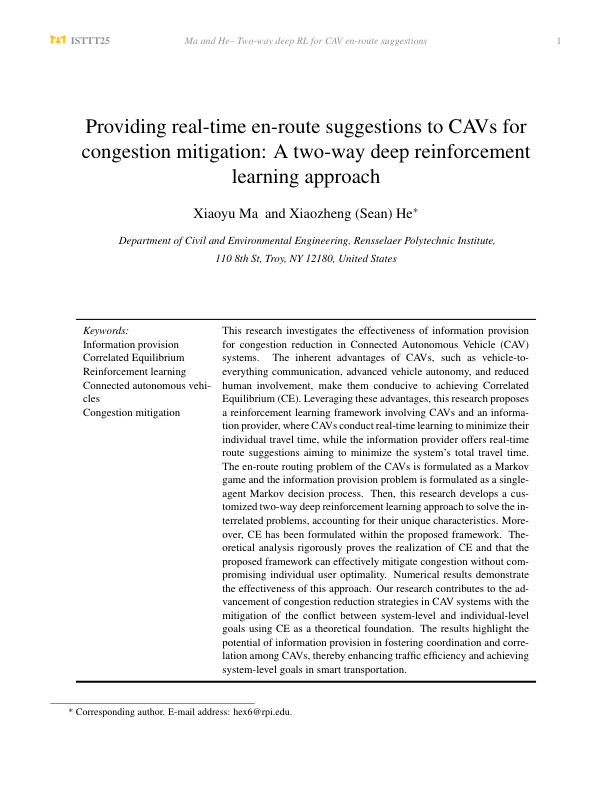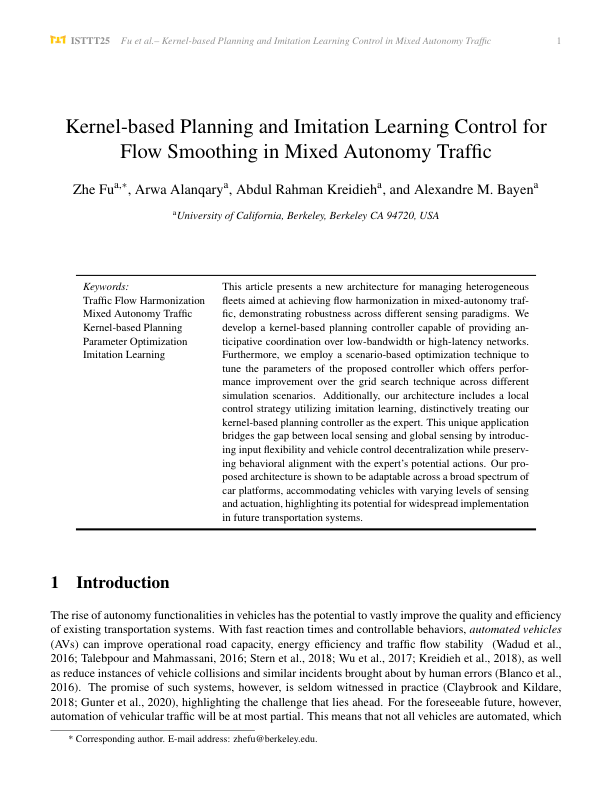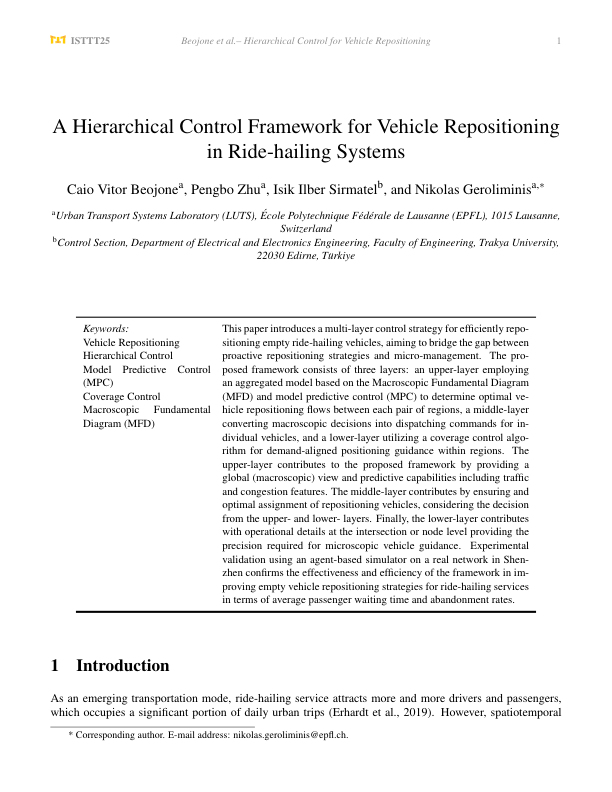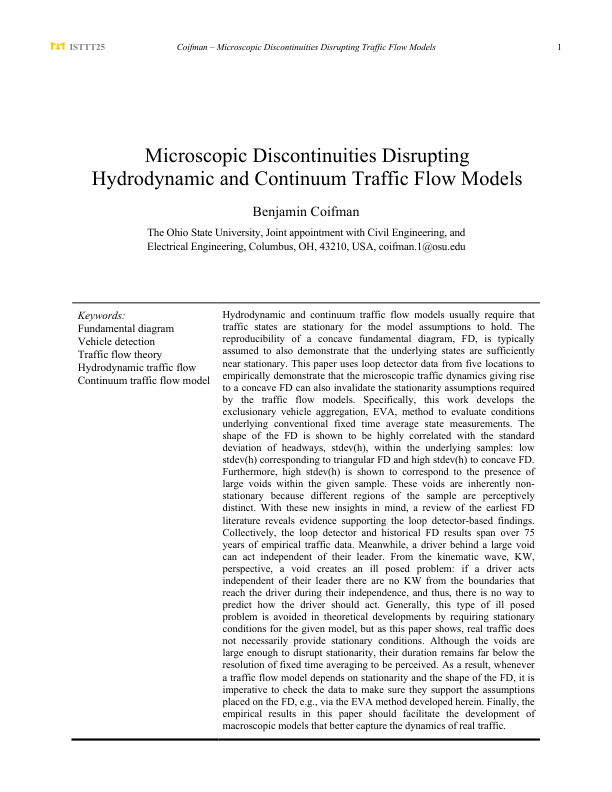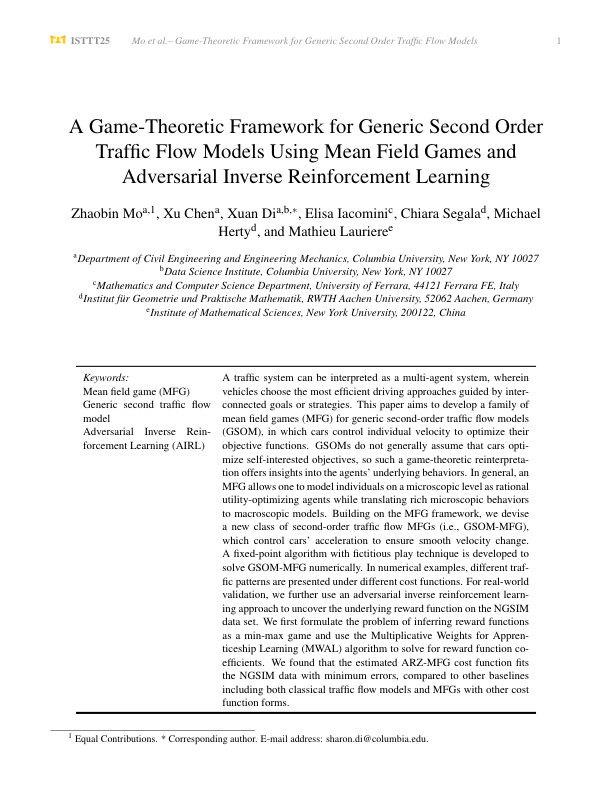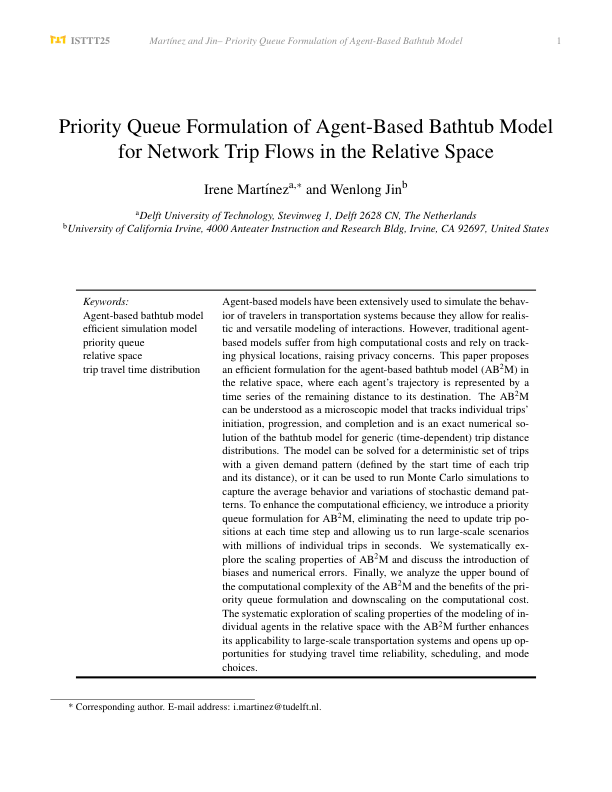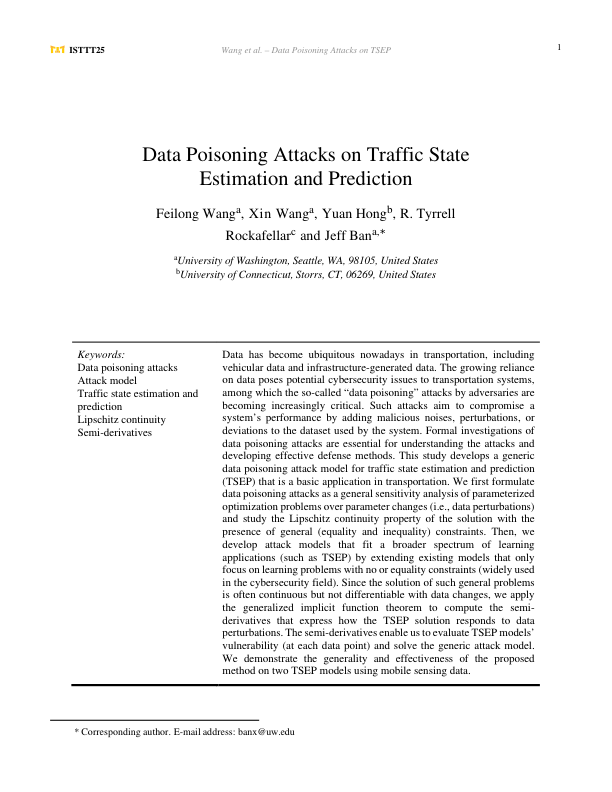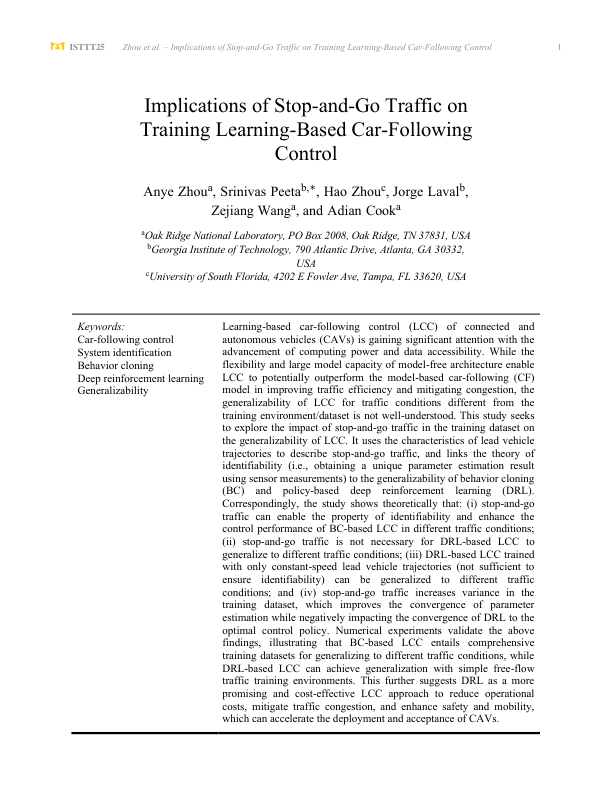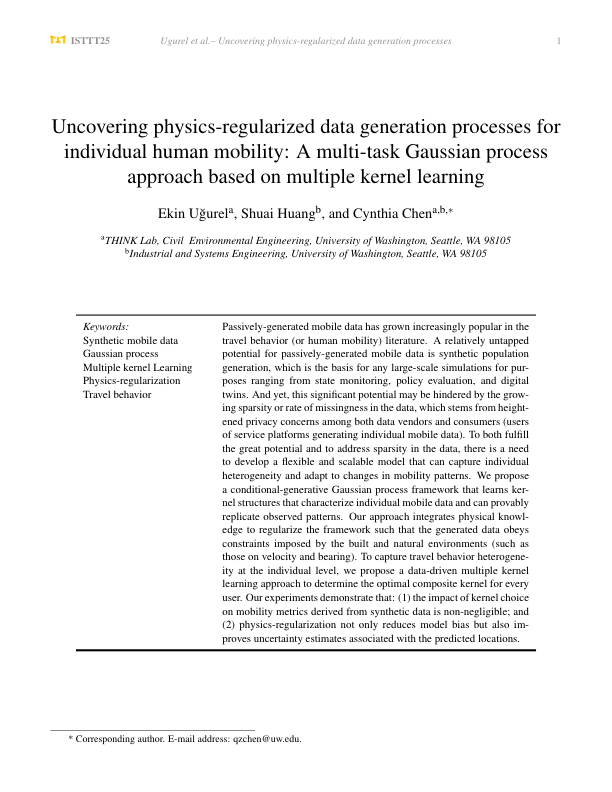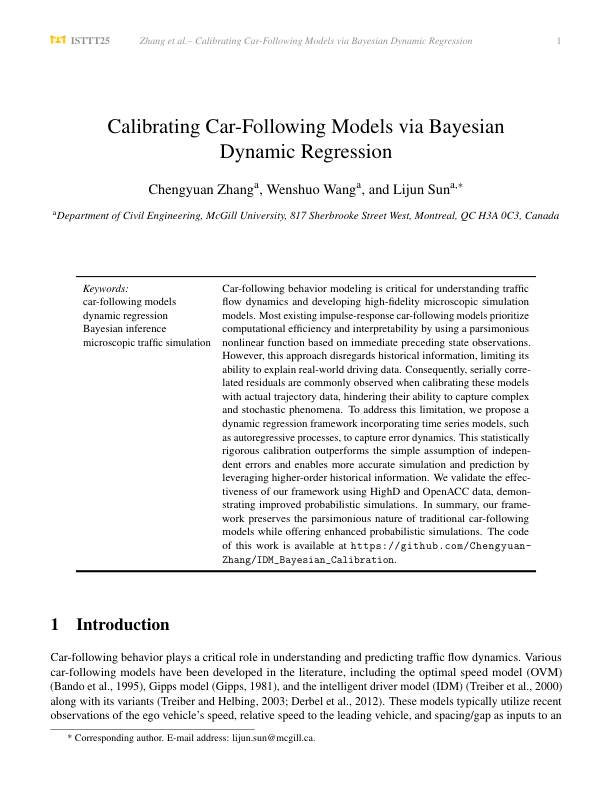Workshop 1: New Entrants in the Airspace: Handling Uncertainty and User Privacy
Title: New Entrants in the Airspace: Handling Uncertainty and User Privacy
Presenter: Max Li
Workshop 1: Enhancing Mobility: The Role of Peer-to-Peer Systems in Modern Transportation
Title: Enhancing Mobility: The Role of Peer-to-Peer Systems in Modern Transportation
Presenter: Neda Masoud
Workshop 1: Challenges and Policy Trends for Future Urban Public Transport Service
Title: Challenges and Policy Trends for Future Urban Public Transport Service
Presenter: Avishai Ceder
Workshop 2: Is Fare Free Transit Just? Quantifying the Impact of Moral Principles on Transit Design and Finance
Title: Is Fare Free Transit Just? Quantifying the Impact of Moral Principles on Transit Design and Finance
Presenter: Yu (Marco) Nie
Workshop 2: Balancing Efficiency and Fairness in Traffic Management and Control
Title: Balancing Efficiency and Fairness in Traffic Management and Control
Presenter: Lina Kattan
Workshop 2: The Equity-Efficiency Trade-off in Transportation: Analyzing the Optimal Joint Pricing and Resource Allocation Strategies under Equity Constraints
Title: The Equity-Efficiency Trade-off in Transportation: Analyzing the Optimal Joint Pricing and Resource Allocation Strategies under Equity Constraints
Presenter: Sisi Jian
Tribute to Richard Allsop, 2 May 1940 – 19 January 2024
Title: Tribute to Richard Allsop, 2 May 1940 - 19 January 2024
Authors: Benjamin Heydecker
Podium Session 1: Alleviating Bus Bunching via Modular Vehicles
Title: Alleviating Bus Bunching via Modular Vehicles
Authors: Yuhao Liu, Zhibin Chen, Xiaolei Wang
Abstract: The notorious phenomenon of bus bunching prevailing in uncontrolled bus systems produces irregular headways and downgrades the level of service by increasing passengers’ expected waiting time. Modular autonomous vehicles (MAVs), due to their ability to split and merge enroute, have the potential to help both late and early buses recover from schedu...
Keywords: Bus bunching; Modular vehicle; Dynamic system; Deep reinforcement learning
Podium Session 1: A Seamless Bus Network without External Transfers Using Autonomous Modular Vehicles
Title: A Seamless Bus Network without External Transfers Using Autonomous Modular Vehicles
Authors: Zaid Saeed Khan, Mónica Menéndez
Abstract: Recently, autonomous modular vehicles (AMVs) capable of enabling in-motion transfer (IMT), i.e. passengers moving between vehicles while the vehicles are traveling, have been developed. IMT allows new paradigms for public transport operations that can enhance the speed, flexibility, and reliability of the system. We leverage IMT technology to propo...
Keywords: Autonomous modular buses; In-motion transfer; Stop-less bus; Transfer-less bus service; Bus network design
Podium Session 1: An Autonomous Modular Public Transit Service
Title: An Autonomous Modular Public Transit Service
Authors: Xi Cheng, Yu (Marco) Nie, Jane Lin
Abstract: In this work, we present a proof-of-concept investigation of Autonomous Modular Public Transit (AMPT) at a network scale and compare it with the traditional fixed-route, fixed-vehicle size transit service in terms of total cost, which consists of both agency’s capital and operational cost (including energy cost) and passenger time cost. We formulat...
Keywords: Autonomous Modular Vehicle Technology (AMVT); Autonomous Modular Public Transit (AMPT); Gridded fixed-route transit network; Pod; Joining/disjoining of pods; Agency and passenger costs
Podium Session 2: Modeling Multi-Modal Curbside Usage in Dynamic Networks
Title: Modeling Multi-Modal Curbside Usage in Dynamic Networks
Authors: Jiachao Liu, Sean Qian
Abstract: The proliferation of emerging mobility technology has led to a significant increase in demand for ride-hailing services, on-demand deliveries, and micro-mobility services, transforming curb spaces into valuable public infrastructure for which multi-modal transportation competes. However, the increasing utilization of curbs by different traffic mode...
Keywords: Dynamic traffic assignment; Curbside management; Mesoscopic traffic simulation; Dynamic OD demand estimation; Computational graph
Podium Session 2: Dynamic Usage Allocation and Pricing for Curbside Space Operation
Title: Dynamic Usage Allocation and Pricing for Curbside Space Operation
Authors: Jisoon Lim, Neda Masoud
Abstract: The importance of curbside management is quickly growing in a modernized urban setting. Dynamic allocation of curb space to different usages and dynamic pricing for those usages can help meet the growing demand for curb space more effectively and promote user turnover. To model curbside operations, we formulate a Stackelberg leader-follower game be...
Keywords: Curb space operation; Stackelberg game; Bi-level optimization; KKT conditions; Benders decomposition
Podium Session 2: Economic Analysis of On-Street Parking with Urban Delivery
Title: Economic Analysis of On-Street Parking with Urban Delivery
Authors: Zhengtian Xu, Xiaotong Sun
Abstract: Problem Definition: The surge in online shopping has dramatically increased the demand for short-term curb access for package pickups and deliveries, leading to heightened competition for limited curb space. This paper addresses the problem of how the unique parking demand of deliverers, particularly their parking duration for delivery attempts lin...
Keywords: Urban logistics; “Final 50 feet” problem; On-street parking; Parking management; Delivery bay
Podium Session 3: Destroying Phantom Jams with Connectivity and Automation: Nonlinear Dynamics and Control of Mixed Traffic
Title: Destroying Phantom Jams with Connectivity and Automation: Nonlinear Dynamics and Control of Mixed Traffic
Authors: Tamas G. Molnar, Gábor Orosz
Abstract: Connected automated vehicles (CAVs) have the potential to improve the efficiency of vehicular traffic. In this paper, we discuss how CAVs can positively impact the dynamic behavior of mixed traffic systems on highways through the lens of nonlinear dynamics theory. First, we show that human-driven traffic exhibits a bistability phenomenon, in which ...
Keywords: Connected automated vehicle; Mixed traffic; Nonlinear dynamics; Time delay
Podium Session 3: Disturbances and Safety Analysis of Linear Adaptive Cruise Control for Cut-in Scenarios: A Theoretical Framework
Title: Disturbances and Safety Analysis of Linear Adaptive Cruise Control for Cut-in Scenarios: A Theoretical Framework
Authors: Zihao Li, Yang Zhou, Danjue Chen, Yunlong Zhang
Abstract: Although adaptive cruise control (ACC) has been widely analyzed in the car-following process, the way it reacts to cut-in maneuvers has been largely ignored. The cut-in maneuvers may trigger multiple disturbances to traffic, resulting in traffic oscillations and corresponding rear-end crashes. Hence, this study provides a theoretical analysis frame...
Keywords: Automated Vehicle (AV); Disturbance analysis; Adaptive Cruise Control (ACC); Cut-in scenarios
Podium Session 3: On Dynamic Fundamental Diagrams: Implications for Automated Vehicles
Title: On Dynamic Fundamental Diagrams: Implications for Automated Vehicles
Authors: Jiwan Jiang, Yang Zhou, Xin Wang, Soyoung (Sue) Ahn
Abstract: The traffic fundamental diagram (FD) describes the relationships among fundamental traffic variables of flow, density, and speed. FD represents fundamental properties of traffic streams, giving insights into traffic performance. This paper presents a theoretical investigation of dynamic FD properties, derived directly from vehicle car-following (co...
Keywords: Automated vehicles; Fundamental diagram; Traffic hysteresis; Traffic oscillation
Lightning Talk 1: Combining Time Dependency and Behavioral Game: A Deep Markov Cognitive Hierarchy Model for Human-Like Discretionary Lane Changing Modeling
Title: Combining Time Dependency and Behavioral Game: A Deep Markov Cognitive Hierarchy Model for Human-Like Discretionary Lane Changing Modeling
Authors: Kehua Chen, Meixin Zhu, Lijun Sun, Hai Yang
Abstract: Human drivers take discretionary lane changes when the target lane is perceived to offer better traffic conditions. Improper discretionary lane changes, however, lead to traffic congestion or even crashes. Considering its significant impact on traffic flow efficiency and safety, accurate modeling and prediction of discretionary lane-changing (LC) b...
Keywords: Discretionary lane changing; Game theory; Hidden markov model; Cognitive hierarchy
Lightning Talk 1: Stability Analysis of a Departure Time Choice Problem with Atomic Vehicle Models
Title: Stability Analysis of a Departure Time Choice Problem with Atomic Vehicle Models
Authors: Koki Satsukawa, Kentaro Wada, Takamasa Iryo
Abstract: In this study, we analyse the global stability of the equilibrium in a departure time choice problem using a game-theoretic approach that deals with atomic users. We first formulate the departure time choice problem as a strategic game in which atomic users select departure times to minimise their trip cost; we call this game the ‘departure time ch...
Keywords: Convergence/stability; Departure time choice problem; Evolutionary dynamics; Epsilon-Nash equilibrium; Atomic users
Lightning Talk 1: Modeling Residual-Vehicle Effects in Undersaturation Conditions on Uncertainty Estimation of the Connected Vehicle Penetration Rate
Title: Modeling Residual-Vehicle Effects in Undersaturation Conditions on Uncertainty Estimation of the Connected Vehicle Penetration Rate
Authors: Shaocheng Jia, S.C. Wong, Wai Wong
Abstract: In the transition to full deployment of connected vehicles (CVs), the CV penetration rate plays a key role in bridging the gap between partial and complete traffic information. Several innovative methods have been proposed to estimate the CV penetration rate using only CV data. However, these methods, as point estimators, may lead to biased estimat...
Keywords: Connected vehicle penetration rate uncertainty; probabilistic penetration rate model; residual vehicle estimation; Markov-constrained queue; length model; signal control with uncertainty
Lightning Talk 1: A Topological Network Connectivity Design Problem Based on Spectral Analysis
Title: A Topological Network Connectivity Design Problem Based on Spectral Analysis
Authors: Shoichiro Nakayama, Shun-ichi Kobayashi, Hiromichi Yamaguchi
Abstract: How to improve network connectivity and which parts of the network are vulnerable are critical issues. We begin by defining an equal distribution problem, in which supplies are distributed equally to all nodes in the network. We then derive a topological network connectivity measure from the convergence speed, which is the second minimum eigenvalue...
Keywords: Connectivity; Fiedler vector; Semidefinite programing; Convexity
Lightning Talk 1: Optimizing OD-Based Up-Front Discounting Strategies for Enroute Ridepooling Services
Title: Optimizing OD-Based Up-Front Discounting Strategies for Enroute Ridepooling Services
Authors: Siying Wang, Xiaolei Wang, Chen Yang, Wei Liu, Xiaoning Zhang
Abstract: The technological progress in the recent decade has greatly facilitated the large-scale implementation of dynamic enroute ridepooling services, such as Uber Pool and DiDi Pinche. To sustain a profitable dynamic ridepooling service, a well-designed pricing scheme is crucial. This paper focuses on the optimization of up-front discounting strategies f...
Keywords: enroute ridepooling; up-front pricing strategy; derivative-free optimization
Lightning Talk 1: Two-Step Quadratic Programming for Physically Meaningful Smoothing of Longitudinal Vehicle Trajectories
Title: Two-Step Quadratic Programming for Physically Meaningful Smoothing of Longitudinal Vehicle Trajectories
Authors: Ximeng Fan, Wen-Long Jin, Penghang Yin
Abstract: Longitudinal vehicle trajectories suffer from errors and noise due to detection and extraction techniques, challenging their applications. Existing smoothing methods either lack physical meaning or cannot ensure solution existence and uniqueness. To address this, we propose a two-step quadratic programming method that aligns smoothed speeds and hig...
Keywords: Longitudinal vehicle trajectories; discrepancy and roughness; two-step quadratic programming; existence and uniqueness; NGSIM and highD data
Lightning Talk 1: A Two-Sided Equilibrium Model of Vehicle-To-Vehicle Charging Platform
Title: A Two-Sided Equilibrium Model of Vehicle-To-Vehicle Charging Platform
Authors: Xuekai Cen, Kanghui Ren, Enoch Lee, Hong K. Lo
Abstract: A novel mobile charging service utilizing vehicle-to-vehicle (V2V) charging technology has been proposed as a complement to fixed charging infrastructure (CI), enabling electric vehicles (EVs) to exchange electricity. This study develops a two-sided equilibrium model for a V2V charging platform, where the demand-side Charging Vehicles (CVs) choose ...
Keywords: Electric Vehicle; Vehicle-to-Vehicle; Charging; Non-cooperative Game; Nash Bargaining
Lightning Talk 1: Transit Fares Integrating Alternative Modes as a Delay Insurance
Title: Transit Fares Integrating Alternative Modes as a Delay Insurance
Authors: Yihe Zhou, Wenzhe Sun, Jan-Dirk Schmöcker
Abstract: Public transport (PT) fare policy remains subject to innovations, not least evident in the Mobility as a Service discussion. Mode integration and related fare strategies can be used to increase the attractiveness of PT by compensating for potential delays. This study proposes “premium fares” as a novel pricing tool that can evaluate and improve the...
Keywords: Travel time reliability; Delay insurance; Premium fare; Integrated multimodal transport; Nonlinear and dynamic programming
Lightning Talk 1: Physics-Informed Machine Learning for Calibrating Macroscopic Traffic Flow Models
Title: Physics-Informed Machine Learning for Calibrating Macroscopic Traffic Flow Models
Authors: Yu Tang, Li Jin, Kaan Ozbay
Abstract: Well-calibrated traffic flow models are fundamental to understanding traffic phenomena and designing control strategies. Traditional calibration has been developed based on optimization methods. In this paper, we propose a novel physics-informed, learning-based calibration approach that achieves performances comparable to and even better than those...
Keywords: Physics-informed learning; Parameter identification; Traffic flow models
Lightning Talk 1: Developing Platooning Systems of Connected and Automated Vehicles with Guaranteed Stability and Robustness against Degradation due to Communication Disruption
Title: Developing Platooning Systems of Connected and Automated Vehicles with Guaranteed Stability and Robustness against Degradation due to Communication Disruption
Authors: Yuan Zheng, Yu Zhang, Xu Qu, Shen Li, Bin Ran
Abstract: Connected and automated vehicle platooning systems like cooperative adaptive cruise control (CACC) have shown great potential on improving traffic performance with a shortened time gap through advanced sensing and Vehicle-to-Vehicle (V2V) communication technologies. However, V2V communication is not always reliable in realistic traffic conditions. ...
Keywords: communication disruption; cooperative adaptive cruise control; adaptive cruise control; stability analysis; delay robustness
Lightning Talk 1: Data Driven Origin-Destination Matrix Estimation on Large Networks – A Joint Origin-Destination-Path-Choice Formulation
Title: Data Driven Origin-Destination Matrix Estimation on Large Networks - A Joint Origin-Destination-Path-Choice Formulation
Authors: Yumin Cao, Hans van Lint, Panchamy Krishnakumari, Michiel Bliemer
Abstract: This paper presents a novel approach to data-driven time-dependent origin-destination (OD) estimation using a joint origin-destination-path choice formulation, inspired by the well-known equivalence of doubly constraint gravity models and multinomial logit models for joint O-D choice. This new formulation provides a theoretical basis and generalize...
Keywords: Dynamic OD matrix estimation; Gravity model; Joint origin-destination-path choice; Principal component analysis
Lightning Talk 1: Optimal Operation Strategies of an Urban Crowdshipping Platform in Asset-Light, Asset-Medium, or Asset-Heavy Business Format
Title: Optimal Operation Strategies of an Urban Crowdshipping Platform in Asset-Light, Asset-Medium, or Asset-Heavy Business Format
Authors: Zhuoye Zhang, Fangni Zhang
Abstract: This paper investigates the operation strategies of an urban crowdshipping platform, which utilizes the latent capacity of the traveling ‘crowd’ in the transportation system to facilitate parcel delivery. We develop an analytical model to characterize the decision-making and operation strategies of a crowdshipping operator in alternative business f...
Keywords: Crowdshipping; Two-sided market; Asset-light; Asset-medium; Asset-heavy
Poster Session 1: Combining Time Dependency and Behavioral Game: A Deep Markov Cognitive Hierarchy Model for Human-Like Discretionary Lane Changing Modeling
Title: Combining Time Dependency and Behavioral Game: A Deep Markov Cognitive Hierarchy Model for Human-Like Discretionary Lane Changing Modeling
Authors: Kehua Chen, Meixin Zhu, Lijun Sun, Hai Yang
Abstract: Human drivers take discretionary lane changes when the target lane is perceived to offer better traffic conditions. Improper discretionary lane changes, however, lead to traffic congestion or even crashes. Considering its significant impact on traffic flow efficiency and safety, accurate modeling and prediction of discretionary lane-changing (LC) b...
Keywords: Discretionary lane changing; Game theory; Hidden markov model; Cognitive hierarchy
Poster Session 1: Stability Analysis of a Departure Time Choice Problem with Atomic Vehicle Models
Title: Stability Analysis of a Departure Time Choice Problem with Atomic Vehicle Models
Authors: Koki Satsukawa, Kentaro Wada, Takamasa Iryo
Abstract: In this study, we analyse the global stability of the equilibrium in a departure time choice problem using a game-theoretic approach that deals with atomic users. We first formulate the departure time choice problem as a strategic game in which atomic users select departure times to minimise their trip cost; we call this game the ‘departure time ch...
Keywords: Convergence/stability; Departure time choice problem; Evolutionary dynamics; Epsilon-Nash equilibrium; Atomic users
Poster Session 1: Modeling Residual-Vehicle Effects in Undersaturation Conditions on Uncertainty Estimation of the Connected Vehicle Penetration Rate
Title: Modeling Residual-Vehicle Effects in Undersaturation Conditions on Uncertainty Estimation of the Connected Vehicle Penetration Rate
Authors: Shaocheng Jia, S.C. Wong, Wai Wong
Abstract: In the transition to full deployment of connected vehicles (CVs), the CV penetration rate plays a key role in bridging the gap between partial and complete traffic information. Several innovative methods have been proposed to estimate the CV penetration rate using only CV data. However, these methods, as point estimators, may lead to biased estimat...
Keywords: Connected vehicle penetration rate uncertainty; probabilistic penetration rate model; residual vehicle estimation; Markov-constrained queue; length model; signal control with uncertainty
Poster Session 1: A Topological Network Connectivity Design Problem Based on Spectral Analysis
Title: A Topological Network Connectivity Design Problem Based on Spectral Analysis
Authors: Shoichiro Nakayama, Shun-ichi Kobayashi, Hiromichi Yamaguchi
Abstract: How to improve network connectivity and which parts of the network are vulnerable are critical issues. We begin by defining an equal distribution problem, in which supplies are distributed equally to all nodes in the network. We then derive a topological network connectivity measure from the convergence speed, which is the second minimum eigenvalue...
Keywords: Connectivity; Fiedler vector; Semidefinite programing; Convexity
Poster Session 1: Optimizing OD-Based Up-Front Discounting Strategies for Enroute Ridepooling Services
Title: Optimizing OD-Based Up-Front Discounting Strategies for Enroute Ridepooling Services
Authors: Siying Wang, Xiaolei Wang, Chen Yang, Wei Liu, Xiaoning Zhang
Abstract: The technological progress in the recent decade has greatly facilitated the large-scale implementation of dynamic enroute ridepooling services, such as Uber Pool and DiDi Pinche. To sustain a profitable dynamic ridepooling service, a well-designed pricing scheme is crucial. This paper focuses on the optimization of up-front discounting strategies f...
Keywords: enroute ridepooling; up-front pricing strategy; derivative-free optimization
Poster Session 1: Two-Step Quadratic Programming for Physically Meaningful Smoothing of Longitudinal Vehicle Trajectories
Title: Two-Step Quadratic Programming for Physically Meaningful Smoothing of Longitudinal Vehicle Trajectories
Authors: Ximeng Fan, Wen-Long Jin, Penghang Yin
Abstract: Longitudinal vehicle trajectories suffer from errors and noise due to detection and extraction techniques, challenging their applications. Existing smoothing methods either lack physical meaning or cannot ensure solution existence and uniqueness. To address this, we propose a two-step quadratic programming method that aligns smoothed speeds and hig...
Keywords: Longitudinal vehicle trajectories; discrepancy and roughness; two-step quadratic programming; existence and uniqueness; NGSIM and highD data
Poster Session 1: A Two-Sided Equilibrium Model of Vehicle-To-Vehicle Charging Platform
Title: A Two-Sided Equilibrium Model of Vehicle-To-Vehicle Charging Platform
Authors: Xuekai Cen, Kanghui Ren, Enoch Lee, Hong K. Lo
Abstract: A novel mobile charging service utilizing vehicle-to-vehicle (V2V) charging technology has been proposed as a complement to fixed charging infrastructure (CI), enabling electric vehicles (EVs) to exchange electricity. This study develops a two-sided equilibrium model for a V2V charging platform, where the demand-side Charging Vehicles (CVs) choose ...
Keywords: Electric Vehicle; Vehicle-to-Vehicle; Charging; Non-cooperative Game; Nash Bargaining
Poster Session 1: Transit Fares Integrating Alternative Modes as a Delay Insurance
Title: Transit Fares Integrating Alternative Modes as a Delay Insurance
Authors: Yihe Zhou, Wenzhe Sun, Jan-Dirk Schmöcker
Abstract: Public transport (PT) fare policy remains subject to innovations, not least evident in the Mobility as a Service discussion. Mode integration and related fare strategies can be used to increase the attractiveness of PT by compensating for potential delays. This study proposes “premium fares” as a novel pricing tool that can evaluate and improve the...
Keywords: Travel time reliability; Delay insurance; Premium fare; Integrated multimodal transport; Nonlinear and dynamic programming
Poster Session 1: Physics-Informed Machine Learning for Calibrating Macroscopic Traffic Flow Models
Title: Physics-Informed Machine Learning for Calibrating Macroscopic Traffic Flow Models
Authors: Yu Tang, Li Jin, Kaan Ozbay
Abstract: Well-calibrated traffic flow models are fundamental to understanding traffic phenomena and designing control strategies. Traditional calibration has been developed based on optimization methods. In this paper, we propose a novel physics-informed, learning-based calibration approach that achieves performances comparable to and even better than those...
Keywords: Physics-informed learning; Parameter identification; Traffic flow models
Poster Session 1: Developing Platooning Systems of Connected and Automated Vehicles with Guaranteed Stability and Robustness against Degradation due to Communication Disruption
Title: Developing Platooning Systems of Connected and Automated Vehicles with Guaranteed Stability and Robustness against Degradation due to Communication Disruption
Authors: Yuan Zheng, Yu Zhang, Xu Qu, Shen Li, Bin Ran
Abstract: Connected and automated vehicle platooning systems like cooperative adaptive cruise control (CACC) have shown great potential on improving traffic performance with a shortened time gap through advanced sensing and Vehicle-to-Vehicle (V2V) communication technologies. However, V2V communication is not always reliable in realistic traffic conditions. ...
Keywords: communication disruption; cooperative adaptive cruise control; adaptive cruise control; stability analysis; delay robustness
Poster Session 1: Data Driven Origin-Destination Matrix Estimation on Large Networks – A Joint Origin-Destination-Path-Choice Formulation
Title: Data Driven Origin-Destination Matrix Estimation on Large Networks - A Joint Origin-Destination-Path-Choice Formulation
Authors: Yumin Cao, Hans van Lint, Panchamy Krishnakumari, Michiel Bliemer
Abstract: This paper presents a novel approach to data-driven time-dependent origin-destination (OD) estimation using a joint origin-destination-path choice formulation, inspired by the well-known equivalence of doubly constraint gravity models and multinomial logit models for joint O-D choice. This new formulation provides a theoretical basis and generalize...
Keywords: Dynamic OD matrix estimation; Gravity model; Joint origin-destination-path choice; Principal component analysis
Poster Session 1: Optimal Operation Strategies of an Urban Crowdshipping Platform in Asset-Light, Asset-Medium, or Asset-Heavy Business Format
Title: Optimal Operation Strategies of an Urban Crowdshipping Platform in Asset-Light, Asset-Medium, or Asset-Heavy Business Format
Authors: Zhuoye Zhang, Fangni Zhang
Abstract: This paper investigates the operation strategies of an urban crowdshipping platform, which utilizes the latent capacity of the traveling ‘crowd’ in the transportation system to facilitate parcel delivery. We develop an analytical model to characterize the decision-making and operation strategies of a crowdshipping operator in alternative business f...
Keywords: Crowdshipping; Two-sided market; Asset-light; Asset-medium; Asset-heavy
Podium Session 4: Bus Stop Spacing with Heterogeneous Trip Lengths and Elastic Demand
Title: Bus Stop Spacing with Heterogeneous Trip Lengths and Elastic Demand
Authors: Ayush Pandey, Lewis J. Lehe
Abstract: This paper develops models of a bus route in which (i) stop spacing can vary; (ii) trip lengths are heterogeneous; (iii) demand is elastic; and (iv) passengers delay the bus. Since wider spacings make sufficiently long trips faster, and sufficiently short trips slower, they induce long trips and repel short trips. We explore two continuum-approxima...
Keywords: Bus stops; Economics; Elastic demand; Stop spacing; Bus equilibrium
Podium Session 4: Redesigning Large-Scale Multimodal Transit Networks with Shared Autonomous Mobility Services
Title: Redesigning Large-Scale Multimodal Transit Networks with Shared Autonomous Mobility Services
Authors: Max T.M. Ng, Hani S. Mahmassani, Ömer Verbas, Taner Cokyasar, Roman Engelhardt
Abstract: This study addresses a large-scale multimodal transit network design problem, with Shared Autonomous Mobility Services (SAMS) as both transit feeders and an origin-to-destination mode. The framework captures spatial demand and modal characteristics, considers intermodal transfers and express services, determines transit infrastructure investment an...
Keywords: Transit network design; Multimodal; Network optimization; Shared Autonomous Mobility Services (SAMS); Autonomous vehicles
Podium Session 4: Design of Mixed Fixed-Flexible Bus Public Transport Networks by Tracking the Paths of On-Demand Vehicles
Title: Design of Mixed Fixed-Flexible Bus Public Transport Networks by Tracking the Paths of On-Demand Vehicles
Authors: Andrés Fielbaum, Javier Alonso-Mora
Abstract: On-demand ridepooling (ODRP) vehicles follow routes that are fully flexible. However, when the system does not provide door-to-door service and users can be asked to walk, their paths tend to concentrate, particularly along main streets that connect highly demanded areas of the city. These frequently travelled segments are hence useful to multiple ...
Keywords: Public transport design; On-demand mobility; Ridepooling; Walking legs; Fixed routes
Podium Session 5: Hypercongestion, Autonomous Vehicle, and Urban Spatial Structure
Title: Hypercongestion, Autonomous Vehicle, and Urban Spatial Structure
Authors: Takao Dantsuji, Yuki Takayama
Abstract: This paper examines the effects of hypercongestion mitigation by perimeter control and the introduction of autonomous vehicles on the spatial structures of cities. By incorporating a bathtub model, we develop a land use model where hypercongestion occurs in the downtown area and interacts with land use. We show that hypercongestion mitigation by pe...
Keywords: Hypercongestion; Perimeter control; Autonomous vehicle; Bathtub model; Land use model
Podium Session 5: How and When Cordon Metering Can Reduce Travel Times
Title: How and When Cordon Metering Can Reduce Travel Times
Authors: Jean Doig, Carlos F. Daganzo, Michael J. Cassidy
Abstract: The paper addresses two questions regarding cordon metering that have until now gone unanswered. The first of these pertains to how and where a metered cordon ought to be placed in a city to be of greatest benefit. A simple 3-step rule is proposed that can be readily applied in real settings, and that we call the cordon layout conjecture, or CLC. I...
Keywords: Urban congestion; Cordon metering; Traffic management
Podium Session 5: N‑MP: A Network-State-Based Max Pressure Algorithm Incorporating Regional Perimeter Control
Title: N-MP: A Network-State-Based Max Pressure Algorithm Incorporating Regional Perimeter Control
Authors: Hao Liu, Vikash V. Gayah
Abstract: The Max Pressure (MP) framework has been shown to be an effective real-time decentralized traffic signal control algorithm. However, despite its superior performance and desirable features – such as the maximum stability property – it may still suffer from deterioration in network mobility due to the rise of congestion within specific regions of an...
Keywords: Max pressure; Perimeter control; Decentralized traffic signal control; Connected vehicles; Multi-scale traffic control
Podium Session 5: Integrated Departure and Boundary Control for Low-Altitude Air City Transport Systems
Title: Integrated Departure and Boundary Control for Low-Altitude Air City Transport Systems
Authors: Yazan Safadi, Nikolas Geroliminis, Jack Haddad
Abstract: Connectivity and digitalization will enable new control measures in urban air mobility operations and open new ways for integrating these measures in real-time traffic management. Hence, new control strategies can be designed to regulate both demand and supply of LowAltitude Air city Transport (LAAT) systems. This can be achieved by adjusting aircr...
Keywords: Traffic management and control; Traffic flow; Feedback control; Low-altitude air city transport system; Macroscopic fundamental diagram
Podium Session 6: A Generalized Rationally Inattentive Route Choice Model with Non-uniform Marginal Information Costs
Title: A Generalized Rationally Inattentive Route Choice Model with Non-uniform Marginal Information Costs
Authors: Bo Zhou, Ronghui Liu
Abstract: Information consumes attention. In the information-rich society, a wealth of information can support decision-making, but it can also create poverty of attention to and inability to make the best use of information. This study applies the theory of rational inattention in modelling traveller’s route choice behaviour, where the attention (costs) to ...
Keywords: Route choice; Rational inattention; Non-uniform marginal information costs; Closed-form expression
Podium Session 6: Markov Game for CV Joint Adaptive Routing in Stochastic Traffic Networks: A Scalable Learning Approach
Title: Markov Game for CV Joint Adaptive Routing in Stochastic Traffic Networks: A Scalable Learning Approach
Authors: Shan Yang, Yang Liu
Abstract: This study proposes a learning-based approach to tackle the challenge of joint adaptive routing in stochastic traffic networks with Connected Vehicles (CVs). We introduce a Markov Routing Game (MRG) to model the adaptive routing behavior of all vehicles in such networks, thereby incorporating both competitive route choices and real-time decision-ma...
Keywords: Markov routing game; Connected vehicles; Joint adaptive routing; Mean-field multi-agent reinforcement learning; Stochastic traffic network
Podium Session 6: Estimating Markov Chain Mixing Times: Convergence Rate Towards Equilibrium of a Stochastic Process Traffic Assignment Model
Title: Estimating Markov Chain Mixing Times: Convergence Rate Towards Equilibrium of a Stochastic Process Traffic Assignment Model
Authors: Takamasa Iryo, David Watling, Martin Hazelton
Abstract: Network equilibrium models have been extensively used for decades. The rationale for using equilibrium as a predictor is essentially that (i) a unique and globally stable equilibrium point is guaranteed to exist, and (ii) the transient period over which a system adapts to a change is sufficiently short in time that it can be neglected. However, we ...
Keywords: Markov chain mixing time; Day-to-day dynamics; Stochastic traffic assignment process
Podium Session 6: A Day-to-Day Dynamical Approach to the Most Likely User Equilibrium Problem
Title: A Day-to-Day Dynamical Approach to the Most Likely User Equilibrium Problem
Authors: Jiayang Li, Qianni Wang, Liyang Feng, Jun Xie, Yu (Marco) Nie
Abstract: The lack of a unique user equilibrium (UE) route flow in traffic assignment has posed a significant challenge to many transportation applications. The maximum-entropy principle, which advocates for the consistent selection of the most likely solution, is often used to address the challenge. Built on a recently proposed day-to-day (DTD) discrete-tim...
Keywords: Maximum entropy; Traffic assignment; Cumulative logit; Day-to-day dynamical model; Proportionality condition
Podium Session 7: Reliability Premium: A Unified Conceptual Framework for the Cost of Travel Time Variability
Title: Reliability Premium: A Unified Conceptual Framework for the Cost of Travel Time Variability
Authors: Zhaoqi Zang, Richard Batley, David Z.W. Wang, Hong K. Lo
Abstract: This paper proposes the reliability premium to capture the cost of travel time variability (TTV) directly and intuitively. Its appealing properties enable it to offer a unified framework for both (1) evaluating the cost of TTV in time units from the traveler’s perspective when making route choice decisions and (2) valuing the monetary cost of TTV f...
Keywords: Travel time variability; Risk; Cost; Value of reliability; Reliability premium
Podium Session 7: A Paradox of Telecommuting and Staggered Work Hours in the Bottleneck Model
Title: A Paradox of Telecommuting and Staggered Work Hours in the Bottleneck Model
Authors: Takara Sakai, Takashi Akamatsu, Koki Satsukawa
Abstract: We study the long- and short-term effects of telecommuting (TLC), staggered work hours (SWH), and their combined scheme on peak-period congestion and location patterns. In order to enable a unified comparison of the schemes’ long- and short-term effects, we develop a novel equilibrium analysis approach that consistently synthesizes the long-term eq...
Keywords: Bottleneck model; Corridor network; Telecommuting; Staggered work hours; Departure time choice; Location choice
Podium Session 7: Collective Departure Time Allocation in Large-Scale Urban Networks: A Flexible Modeling Framework with Trip Length and Desired Arrival Time Distributions
Title: Collective Departure Time Allocation in Large-Scale Urban Networks: A Flexible Modeling Framework with Trip Length and Desired Arrival Time Distributions
Authors: Mostafa Ameli, Jean-Patrick Lebacque, Negin Alisoltani, Ludovic Leclercq
Abstract: Urban traffic congestion remains a persistent issue for cities worldwide. Recent macroscopic models have adopted a mathematically well-defined relation between network flow and density to characterize traffic states over an urban region. Despite advances in these models, capturing the complex dynamics of urban traffic congestion requires considerin...
Keywords: Traffic congestion; Peak-hour traffic dynamics; Macroscopic model; Social optimum; Generalized bathtub model; Morning commute problem; System optimum; Network equilibrium; Marginal travel cost
Podium Session 7: A Novel Mobility Consumption Theory for Road User Charging
Title: A Novel Mobility Consumption Theory for Road User Charging
Authors: Michiel C.J. Bliemer, Allister Loder, Zuduo Zheng
Abstract: Building on the analogy between electrical energy and mobility, we propose a novel mobility consumption theory based on the idea of the required reserved space headway of vehicles while driving. In this theory, mobility is “produced” by road infrastructure and is “consumed” by drivers in a similar fashion to power that is produced in power plants a...
Keywords: Road use; Mobility consumption; Road pricing reform; Road user charging
Lightning Talk 2: Modeling an On-Demand Meal Delivery System with Human Couriers and Autonomous Vehicles in a Spatial Market
Title: Modeling an On-Demand Meal Delivery System with Human Couriers and Autonomous Vehicles in a Spatial Market
Authors: Anke Ye, Kenan Zhang, Michael G.H. Bell, Xiqun (Michael) Chen, Simon Hu
Abstract: This paper investigates the impacts of introducing autonomous vehicles (AVs) into an on-demand meal delivery system at a strategic level. The proposed model consists of (i) a microscopic physical model describing the delivery process for bundled orders and (ii) a macroscopic network equilibrium model characterizing the interactions among customers,...
Keywords: On-demand meal delivery; Autonomous vehicles; Bundling delivery; Network equilibrium; Strategic management
Lightning Talk 2: Mobility Service Providers’ Interacting Strategies under Multi-Modal Equilibrium
Title: Mobility Service Providers' Interacting Strategies under Multi-Modal Equilibrium
Authors: Claudia Bandiera, Richard D. Connors, Francesco Viti
Abstract: In this paper, we analyse the interactions between Mobility Service Providers (MSP) strategies in a multi-modal system. We formulate the problem using a bi-level structure extending Multi-modal Network Design (MND) principles. The upper level models the profit maximisation objectives of multiple MSPs operating and offering different services to the...
Keywords: Mobility-as-a-Service; Mobility Service Providers; Multi-modal Equilibrium; Variational Inequality; EPEC
Lightning Talk 2: Planning Service Protocols for Extra-Long Trains with Transfers
Title: Planning Service Protocols for Extra-Long Trains with Transfers
Authors: Jesus Osorio, Shiyu Shen, Yanfeng Ouyang
Abstract: This paper presents a modeling framework for optimizing operational protocols of extra-long trains (XLTs) in metro systems; i.e., trains longer than station platforms. With the rising travel demand in megacities, metro systems face challenges such as overcrowded stations, delays, and passenger anxieties. XLTs have been proposed as a promising solut...
Keywords: Metro train; Timetabling; Extra-long train; Mixed-integer program; Network design
Lightning Talk 2: Network Macroscopic Fundamental Diagram-Informed Graph Learning Method for Traffic State Imputation
Title: Network Macroscopic Fundamental Diagram-Informed Graph Learning Method for Traffic State Imputation
Authors: Jiawei Xue, Eunhan Ka, Yiheng Feng, Satish V. Ukkusuri
Abstract: Traffic state imputation refers to the estimation of missing values of traffic variables, such as flow rate and traffic density, using available data. It furnishes traffic context for various operation tasks such as vehicle routing, and enables us to augment existing datasets (e.g., PeMS, UTD19, Uber Movement) for diverse theoretical and practical ...
Keywords: Traffic state imputation; Physics-informed machine learning; Network macroscopic funda-mental diagram; Graph neural networks
Lightning Talk 2: Distributionally Robust Origin Destination Demand Estimation
Title: Distributionally Robust Origin Destination Demand Estimation
Authors: Jingxing Wang, Jun Song, Chaoyue Zhao, Xuegang (Jeff) Ban
Abstract: Gaining a good understanding of the travel demands of a city or region is extremely important for many transportation applications. For stochastic origin-destination (OD) estimation problems, an accurate distribution assumption or observation of OD estimates or data is usually desired but not always available. In this paper, we establish a novel tw...
Keywords: OD demand estimation; distributionally robust optimization; quasi-sparsity
Lightning Talk 2: Offline Planning and Online Operation of Zonal-Based Flexible Bus Service under Demand Uncertainties and Dynamic Cancellations
Title: Offline Planning and Online Operation of Zonal-Based Flexible Bus Service under Demand Uncertainties and Dynamic Cancellations
Authors: Manzi Li, Enoch Lee, Hong K. Lo
Abstract: This paper introduces a comprehensive framework for planning an operating a zonal-based flexible bus service, a public transit mode designed to accommodate uncertain demand patterns. The framework addresses both offline planning based on stochastic demand distributions and cancellations, as well as online routing considering real-time orders and ca...
Keywords: On-demand transit; Dynamic optimisation; Flexible bus; Order cancellation; Stochastic demand; Three-phase optimisation
Lightning Talk 2: Bridging the Gap between Micro-Economics and Micro-Mobility: A Two-Dimensional Risk-Based Microscopic Model of Pedestrians’ and Bicyclists’ Operational Behaviors
Title: Bridging the Gap between Micro-Economics and Micro-Mobility: A Two-Dimensional Risk-Based Microscopic Model of Pedestrians' and Bicyclists' Operational Behaviors
Authors: Mohaiminul Haque, Samer Hamdar, Alireza Talebpour
Abstract: Due to the inherent safety concerns associated with traffic movement in unconstrained two-dimensional settings, it is important that pedestrians’ and other modes’ movements such as bicyclists are modeled as a risk-taking stochastic dynamic process that may lead to errors and thus contacts and collisions. Among the existing models that may capture r...
Keywords: Bicycles; Pedestrians; Prospect Theory; Safety; Traffic Simulation
Lightning Talk 2: Estimation of Schedule Preference and Crowding Perception in Urban Rail Corridor Commuting: An Inverse Optimization Method
Title: Estimation of Schedule Preference and Crowding Perception in Urban Rail Corridor Commuting: An Inverse Optimization Method
Authors: Pu Xu, Tian-Liang Liu, Qiong Tian, Bingfeng Si, Wei Liu, Hai-Jun Huang
Abstract: This paper introduces an inverse optimization method to uncover commuters’ schedule preference and crowding perception based on aggregated observations from smart card data for an urban rail corridor system. The assessment of time-of-use preferences typically involves the use of econometric models of discrete choice based on detailed travel survey ...
Keywords: Travel behavior; Rail transit; Morning commute; Smart card data; Inverse optimization
Lightning Talk 2: Providing Real-Time En-Route Suggestions to CAVs for Congestion Mitigation: A Two-Way Deep Reinforcement Learning Approach
Title: Providing Real-Time En-Route Suggestions to CAVs for Congestion Mitigation: A Two-Way Deep Reinforcement Learning Approach
Authors: Xiaoyu Ma, Xiaozheng (Sean) He
Abstract: This research investigates the effectiveness of information provision for congestion reduction in Connected Autonomous Vehicle (CAV) systems. The inherent advantages of CAVs, such as vehicle-to-everything communication, advanced vehicle autonomy, and reduced human involvement, make them conducive to achieving Correlated Equilibrium (CE). Leveraging...
Keywords: Information provision; Correlated Equilibrium; Reinforcement learning; Connected autonomous vehicles; Congestion mitigation
Lightning Talk 2: Sensor Placement Considering the Observability of Traffic Dynamics: On the Algebraic and Graphical Perspectives
Title: Sensor Placement Considering the Observability of Traffic Dynamics: On the Algebraic and Graphical Perspectives
Authors: Xinyue Hu, Yueyue Fan
Abstract: In this paper, we present a new sensor location model that aims to maximize the observability of link densities in a dynamic traffic network described using a piecewise linear ODE system. We develop an algebraic approach based on the eigenstructure to determine the sensor location for achieving full observability with a minimal number of sensors. A...
Keywords: dynamic traffic networks; sensor location problem; exact observability; structural observability
Lightning Talk 2: Kernel-Based Planning and Imitation Learning Control for Flow Smoothing in Mixed Autonomy Traffic
Title: Kernel-Based Planning and Imitation Learning Control for Flow Smoothing in Mixed Autonomy Traffic
Authors: Zhe Fu, Arwa Alanqary, Abdul Rahman Kreidieh, Alexandre M. Bayen
Abstract: This article presents a new architecture for managing heterogeneous fleets aimed at achieving flow harmonization in mixed-autonomy traffic, demonstrating robustness across different sensing paradigms. We develop a kernel-based planning controller capable of providing anticipative coordination over low-bandwidth or high-latency networks. Furthermore...
Keywords: Traffic Flow Harmonization; Mixed Autonomy Traffic; Kernel-based Planning; Parameter Optimization; Imitation Learning
Lightning Talk 2: Simulation-Based Robust and Adaptive Optimization Method for Heteroscedastic Transportation Problems
Title: Simulation-Based Robust and Adaptive Optimization Method for Heteroscedastic Transportation Problems
Authors: Ziyuan Gu, Yifan Li, Meead Saberi, Zhiyuan Liu
Abstract: Simulation-based optimization is an effective solution to complex transportation problems relying on stochastic simulations. However, existing studies generally performed a fixed number of evaluations for each decision vector across the design space, overlooking simulation heteroscedasticity and its effects on solution efficiency and robustness. In...
Keywords: Simulation-based optimization; Robust design; Computational resources allocation; Bayesian inference; Heteroscedasticity
Poster Session 2: Modeling an On-Demand Meal Delivery System with Human Couriers and Autonomous Vehicles in a Spatial Market
Title: Modeling an On-Demand Meal Delivery System with Human Couriers and Autonomous Vehicles in a Spatial Market
Authors: Anke Ye, Kenan Zhang, Michael G.H. Bell, Xiqun (Michael) Chen, Simon Hu
Abstract: This paper investigates the impacts of introducing autonomous vehicles (AVs) into an on-demand meal delivery system at a strategic level. The proposed model consists of (i) a microscopic physical model describing the delivery process for bundled orders and (ii) a macroscopic network equilibrium model characterizing the interactions among customers,...
Keywords: On-demand meal delivery; Autonomous vehicles; Bundling delivery; Network equilibrium; Strategic management
Poster Session 2: Mobility Service Providers’ Interacting Strategies under Multi-Modal Equilibrium
Title: Mobility Service Providers' Interacting Strategies under Multi-Modal Equilibrium
Authors: Claudia Bandiera, Richard D. Connors, Francesco Viti
Abstract: In this paper, we analyse the interactions between Mobility Service Providers (MSP) strategies in a multi-modal system. We formulate the problem using a bi-level structure extending Multi-modal Network Design (MND) principles. The upper level models the profit maximisation objectives of multiple MSPs operating and offering different services to the...
Keywords: Mobility-as-a-Service; Mobility Service Providers; Multi-modal Equilibrium; Variational Inequality; EPEC
Poster Session 2: Planning Service Protocols for Extra-Long Trains with Transfers
Title: Planning Service Protocols for Extra-Long Trains with Transfers
Authors: Jesus Osorio, Shiyu Shen, Yanfeng Ouyang
Abstract: This paper presents a modeling framework for optimizing operational protocols of extra-long trains (XLTs) in metro systems; i.e., trains longer than station platforms. With the rising travel demand in megacities, metro systems face challenges such as overcrowded stations, delays, and passenger anxieties. XLTs have been proposed as a promising solut...
Keywords: Metro train; Timetabling; Extra-long train; Mixed-integer program; Network design
Poster Session 2: Network Macroscopic Fundamental Diagram-Informed Graph Learning Method for Traffic State Imputation
Title: Network Macroscopic Fundamental Diagram-Informed Graph Learning Method for Traffic State Imputation
Authors: Jiawei Xue, Eunhan Ka, Yiheng Feng, Satish V. Ukkusuri
Abstract: Traffic state imputation refers to the estimation of missing values of traffic variables, such as flow rate and traffic density, using available data. It furnishes traffic context for various operation tasks such as vehicle routing, and enables us to augment existing datasets (e.g., PeMS, UTD19, Uber Movement) for diverse theoretical and practical ...
Keywords: Traffic state imputation; Physics-informed machine learning; Network macroscopic funda-mental diagram; Graph neural networks
Poster Session 2: Distributionally Robust Origin Destination Demand Estimation
Title: Distributionally Robust Origin Destination Demand Estimation
Authors: Jingxing Wang, Jun Song, Chaoyue Zhao, Xuegang (Jeff) Ban
Abstract: Gaining a good understanding of the travel demands of a city or region is extremely important for many transportation applications. For stochastic origin-destination (OD) estimation problems, an accurate distribution assumption or observation of OD estimates or data is usually desired but not always available. In this paper, we establish a novel tw...
Keywords: OD demand estimation; distributionally robust optimization; quasi-sparsity
Poster Session 2: Offline Planning and Online Operation of Zonal-Based Flexible Bus Service under Demand Uncertainties and Dynamic Cancellations
Title: Offline Planning and Online Operation of Zonal-Based Flexible Bus Service under Demand Uncertainties and Dynamic Cancellations
Authors: Manzi Li, Enoch Lee, Hong K. Lo
Abstract: This paper introduces a comprehensive framework for planning an operating a zonal-based flexible bus service, a public transit mode designed to accommodate uncertain demand patterns. The framework addresses both offline planning based on stochastic demand distributions and cancellations, as well as online routing considering real-time orders and ca...
Keywords: On-demand transit; Dynamic optimisation; Flexible bus; Order cancellation; Stochastic demand; Three-phase optimisation
Poster Session 2: Bridging the Gap between Micro-Economics and Micro-Mobility: A Two-Dimensional Risk-Based Microscopic Model of Pedestrians’ and Bicyclists’ Operational Behaviors
Title: Bridging the Gap between Micro-Economics and Micro-Mobility: A Two-Dimensional Risk-Based Microscopic Model of Pedestrians' and Bicyclists' Operational Behaviors
Authors: Mohaiminul Haque, Samer Hamdar, Alireza Talebpour
Abstract: Due to the inherent safety concerns associated with traffic movement in unconstrained two-dimensional settings, it is important that pedestrians’ and other modes’ movements such as bicyclists are modeled as a risk-taking stochastic dynamic process that may lead to errors and thus contacts and collisions. Among the existing models that may capture r...
Keywords: Bicycles; Pedestrians; Prospect Theory; Safety; Traffic Simulation
Poster Session 2: Estimation of Schedule Preference and Crowding Perception in Urban Rail Corridor Commuting: An Inverse Optimization Method
Title: Estimation of Schedule Preference and Crowding Perception in Urban Rail Corridor Commuting: An Inverse Optimization Method
Authors: Pu Xu, Tian-Liang Liu, Qiong Tian, Bingfeng Si, Wei Liu, Hai-Jun Huang
Abstract: This paper introduces an inverse optimization method to uncover commuters’ schedule preference and crowding perception based on aggregated observations from smart card data for an urban rail corridor system. The assessment of time-of-use preferences typically involves the use of econometric models of discrete choice based on detailed travel survey ...
Keywords: Travel behavior; Rail transit; Morning commute; Smart card data; Inverse optimization
Poster Session 2: Providing Real-Time En-Route Suggestions to CAVs for Congestion Mitigation: A Two-Way Deep Reinforcement Learning Approach
Title: Providing Real-Time En-Route Suggestions to CAVs for Congestion Mitigation: A Two-Way Deep Reinforcement Learning Approach
Authors: Xiaoyu Ma, Xiaozheng (Sean) He
Abstract: This research investigates the effectiveness of information provision for congestion reduction in Connected Autonomous Vehicle (CAV) systems. The inherent advantages of CAVs, such as vehicle-to-everything communication, advanced vehicle autonomy, and reduced human involvement, make them conducive to achieving Correlated Equilibrium (CE). Leveraging...
Keywords: Information provision; Correlated Equilibrium; Reinforcement learning; Connected autonomous vehicles; Congestion mitigation
Poster Session 2: Sensor Placement Considering the Observability of Traffic Dynamics: On the Algebraic and Graphical Perspectives
Title: Sensor Placement Considering the Observability of Traffic Dynamics: On the Algebraic and Graphical Perspectives
Authors: Xinyue Hu, Yueyue Fan
Abstract: In this paper, we present a new sensor location model that aims to maximize the observability of link densities in a dynamic traffic network described using a piecewise linear ODE system. We develop an algebraic approach based on the eigenstructure to determine the sensor location for achieving full observability with a minimal number of sensors. A...
Keywords: dynamic traffic networks; sensor location problem; exact observability; structural observability
Poster Session 2: Kernel-Based Planning and Imitation Learning Control for Flow Smoothing in Mixed Autonomy Traffic
Title: Kernel-Based Planning and Imitation Learning Control for Flow Smoothing in Mixed Autonomy Traffic
Authors: Zhe Fu, Arwa Alanqary, Abdul Rahman Kreidieh, Alexandre M. Bayen
Abstract: This article presents a new architecture for managing heterogeneous fleets aimed at achieving flow harmonization in mixed-autonomy traffic, demonstrating robustness across different sensing paradigms. We develop a kernel-based planning controller capable of providing anticipative coordination over low-bandwidth or high-latency networks. Furthermore...
Keywords: Traffic Flow Harmonization; Mixed Autonomy Traffic; Kernel-based Planning; Parameter Optimization; Imitation Learning
Poster Session 2: Simulation-Based Robust and Adaptive Optimization Method for Heteroscedastic Transportation Problems
Title: Simulation-Based Robust and Adaptive Optimization Method for Heteroscedastic Transportation Problems
Authors: Ziyuan Gu, Yifan Li, Meead Saberi, Zhiyuan Liu
Abstract: Simulation-based optimization is an effective solution to complex transportation problems relying on stochastic simulations. However, existing studies generally performed a fixed number of evaluations for each decision vector across the design space, overlooking simulation heteroscedasticity and its effects on solution efficiency and robustness. In...
Keywords: Simulation-based optimization; Robust design; Computational resources allocation; Bayesian inference; Heteroscedasticity
Podium Session 8: Design an Intermediary Mobility-As-A-Service (MaaS) Platform Using Many-To-Many Stable Matching Framework
Title: Design an Intermediary Mobility-As-A-Service (MaaS) Platform Using Many-To-Many Stable Matching Framework
Authors: Rui Yao, Kenan Zhang
Abstract: Mobility-as-a-service (MaaS) provides seamless door-to-door trips by integrating different transport modes. Although many MaaS platforms have emerged in recent years, most of them remain at a limited integration level. This study investigates the assignment and pricing problem for a MaaS platform as an intermediary in a multi-modal transportation n...
Keywords: mobility-as-a-service (MaaS); many-to-many stable matching; network design; multi-modal traffic assignment
Podium Session 8: A Hierarchical Control Framework for Vehicle Repositioning in Ride-Hailing Systems
Title: A Hierarchical Control Framework for Vehicle Repositioning in Ride-Hailing Systems
Authors: Caio Vitor Beojone, Pengbo Zhu, Isik Ilber Sirmatelb, Nikolas Geroliminis
Abstract: This paper introduces a multi-layer control strategy for efficiently repositioning empty ride-hailing vehicles, aiming to bridge the gap between proactive repositioning strategies and micro-management. The proposed framework consists of three layers: an upper-layer employing an aggregated model based on the Macroscopic Fundamental Diagram (MFD) and...
Keywords: Vehicle Repositioning; Hierarchical Control; Model Predictive Control (MPC); Coverage Control; Macroscopic Fundamental Diagram (MFD)
Podium Session 8: On-Demand Meal Delivery: A Markov Model for Circulating Couriers
Title: On-Demand Meal Delivery: A Markov Model for Circulating Couriers
Authors: Michael G H Bell, Dat Tien Le, Jyotirmoyee Bhattacharjya, Glenn Geers
Abstract: On-demand meal delivery has become a feature of most cities around the world as a result of platforms and apps that facilitate it, as well as the pandemic, which for a period closed restaurants. Meals are delivered by couriers, typically on bikes, e-bikes or scooters, who circulate collecting meals from kitchens and delivering them to customers, wh...
Keywords: Ghost kitchens; On-demand delivery; Markov chains
Podium Session 9: Microscopic Discontinuities Disrupting Hydrodynamic and Continuum Traffic Flow Models
Title: Microscopic Discontinuities Disrupting Hydrodynamic and Continuum Traffic Flow Models
Authors: Benjamin Coifman
Abstract: Hydrodynamic and continuum traffic flow models usually require that traffic states are stationary for the model assumptions to hold. The reproducibility of a concave fundamental diagram, FD, is typically assumed to also demonstrate that the underlying states are sufficiently near stationary. This paper uses loop detector data from five locations to...
Keywords: Fundamental diagram; Vehicle detection; Traffic flow theory; Hydrodynamic traffic flow; Continuum traffic flow model
Podium Session 9: A Game-Theoretic Framework for Generic Second Order Traffic Flow Using Mean Field Games and Adversarial Inverse Reinforcement Learning
Title: A Game-Theoretic Framework for Generic Second Order Traffic Flow Using Mean Field Games and Adversarial Inverse Reinforcement Learning
Authors: Zhaobin Mo, Xu Chen, Xuan Di, Elisa Iacomini, Chiara Segala, Michael Herty, Mathieu Lauriere
Abstract: A traffic system can be interpreted as a multi-agent system, wherein vehicles choose the most efficient driving approaches guided by inter-connected goals or strategies. This paper aims to develop a family of mean field games (MFG) for generic second-order traffic flow models (GSOM), in which cars control individual velocity to optimize their objec...
Keywords: Mean field game (MFG); Generic second traffic flow model; Adversarial Inverse Reinforcement Learning (AIRL)
Podium Session 9: Priority Queue Formulation of Agent-Based Bathtub Model for Network Trip Flows in the Relative Space
Title: Priority Queue Formulation of Agent-Based Bathtub Model for Network Trip Flows in the Relative Space
Authors: Irene Martínez, Wenlong Jin
Abstract: Agent-based models have been extensively used to simulate the behavior of travelers in transportation systems because they allow for realistic and versatile modeling of interactions. However, traditional agent-based models suffer from high computational costs and rely on tracking physical locations, raising privacy concerns. This paper proposes an ...
Keywords: Agent-based bathtub model; efficient simulation model; priority queue relative space; trip travel time distribution
Podium Session 9: Data Poisoning Attacks on Traffic State Estimation and Prediction
Title: Data Poisoning Attacks on Traffic State Estimation and Prediction
Authors: Feilong Wang, Xin Wang, Yuan Hong, R. Tyrrell Rockafellarc, Jeff Ban
Abstract: Data has become ubiquitous nowadays in transportation, including vehicular data and infrastructure-generated data. The growing reliance on data poses potential cybersecurity issues to transportation systems, among which the so-called “data poisoning” attacks by adversaries are becoming increasingly critical. Such attacks aim to compromise a system’...
Keywords: Data poisoning attacks; Attack model; Traffic state estimation and prediction; Lipschitz continuity; Semi-derivatives
Podium Session 10: Privacy-Preserving Data Fusion for Traffic State Estimation: A Vertical Federated Learning Approach
Title: Privacy-Preserving Data Fusion for Traffic State Estimation: A Vertical Federated Learning Approach
Authors: Qiqing Wang, Kaidi Yang
Abstract: This paper proposes a privacy-preserving data fusion method for traffic state estimation (TSE). Unlike existing works that assume all data sources to be accessible by a single trusted party, we explicitly address data privacy concerns that arise in the collaboration and data sharing between multiple data owners, such as municipal authorities (MAs) ...
Keywords: Data Fusion; Federated Learning; Data Privacy; Traffic State Estimation; Traffic Flow Theory
Podium Session 10: Implications of Stop-and-Go Traffic on Training Learning-Based Car-Following Control
Title: Implications of Stop-and-Go Traffic on Training Learning-Based Car-Following Control
Authors: Anye Zhou, Srinivas Peeta, Hao Zhou, Jorge Laval, Zejiang Wang, Adian Cook
Abstract: Learning-based car-following control (LCC) of connected and autonomous vehicles (CAVs) is gaining significant attention with the advancement of computing power and data accessibility. While the flexibility and large model capacity of model-free architecture enable LCC to potentially outperform the model-based car-following (CF) model in improving t...
Keywords: Car-following control; System identification; Behavior cloning; Deep reinforcement learning; Generalizability
Podium Session 10: Uncovering Physics-Regularized Data Generation Processes for Individual Human Mobility: A Multi-Task Gaussian Process Approach Based on Multiple Kernel Learning
Title: Uncovering Physics-Regularized Data Generation Processes for Individual Human Mobility: A Multi-Task Gaussian Process Approach Based on Multiple Kernel Learning
Authors: Ekin Uğurel, Shuai Huang, Cynthia Chen
Abstract: Passively-generated mobile data has grown increasingly popular in the travel behavior (or human mobility) literature. A relatively untapped potential for passively-generated mobile data is synthetic population generation, which is the basis for any large-scale simulations for purposes ranging from state monitoring, policy evaluation, and digital tw...
Keywords: Synthetic mobile data; Gaussian process; Multiple kernel Learning; Physics-regularization; Travel behavior
Podium Session 10: Calibrating Car-Following Models via Bayesian Dynamic Regression
Title: Calibrating Car-Following Models via Bayesian Dynamic Regression
Authors: Chengyuan Zhang, Wenshuo Wang, Lijun Sun
Abstract: Car-following behavior modeling is critical for understanding traffic flow dynamics and developing high-fidelity microscopic simulation models. Most existing impulse-response car-following models prioritize computational efficiency and interpretability by using a parsimonious nonlinear function based on immediate preceding state observations. Howev...
Keywords: car-following models; dynamic regression; Bayesian inference; microscopic traffic simulation
Edited by Guoyang Qin





